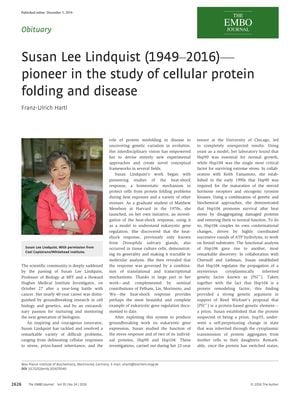Susan Lee Lindquist (1949–2016)—Pioneer in the Study of Cellular Protein Folding and Disease
December 2016
in “
EMBO journal
”

TLDR Susan Lee Lindquist was a pioneering biologist who made significant contributions to understanding protein folding and its role in disease.
Susan Lee Lindquist, a renowned biologist at MIT and a Howard Hughes Medical Institute Investigator, passed away on October 27 after a year-long battle with cancer. Her nearly 40-year career featured pioneering research in cell biology and genetics, particularly in the study of cellular protein folding and its implications for disease. Lindquist's early work as a graduate student at Harvard led to significant insights into the heat-shock response, a cellular defense mechanism against protein misfolding. She discovered that this response was a universal eukaryotic gene regulation mechanism. Her subsequent research at the University of Chicago uncovered the critical roles of the proteins Hsp90 and Hsp104 in cellular growth and stress survival, respectively. Lindquist's work also contributed to the understanding of prions, protein-based genetic elements, and their role in inheritance and disease. Later, her research at the Whitehead Institute focused on molecular chaperones and stress response pathways in neurodegenerative diseases and cancer, leading to potential new therapeutic strategies. Lindquist was a passionate mentor and advocate for science, leaving behind a legacy of successful students and postdocs. She received numerous prestigious awards and was a member of several esteemed scientific societies. Her passing is a significant loss to the scientific community.



